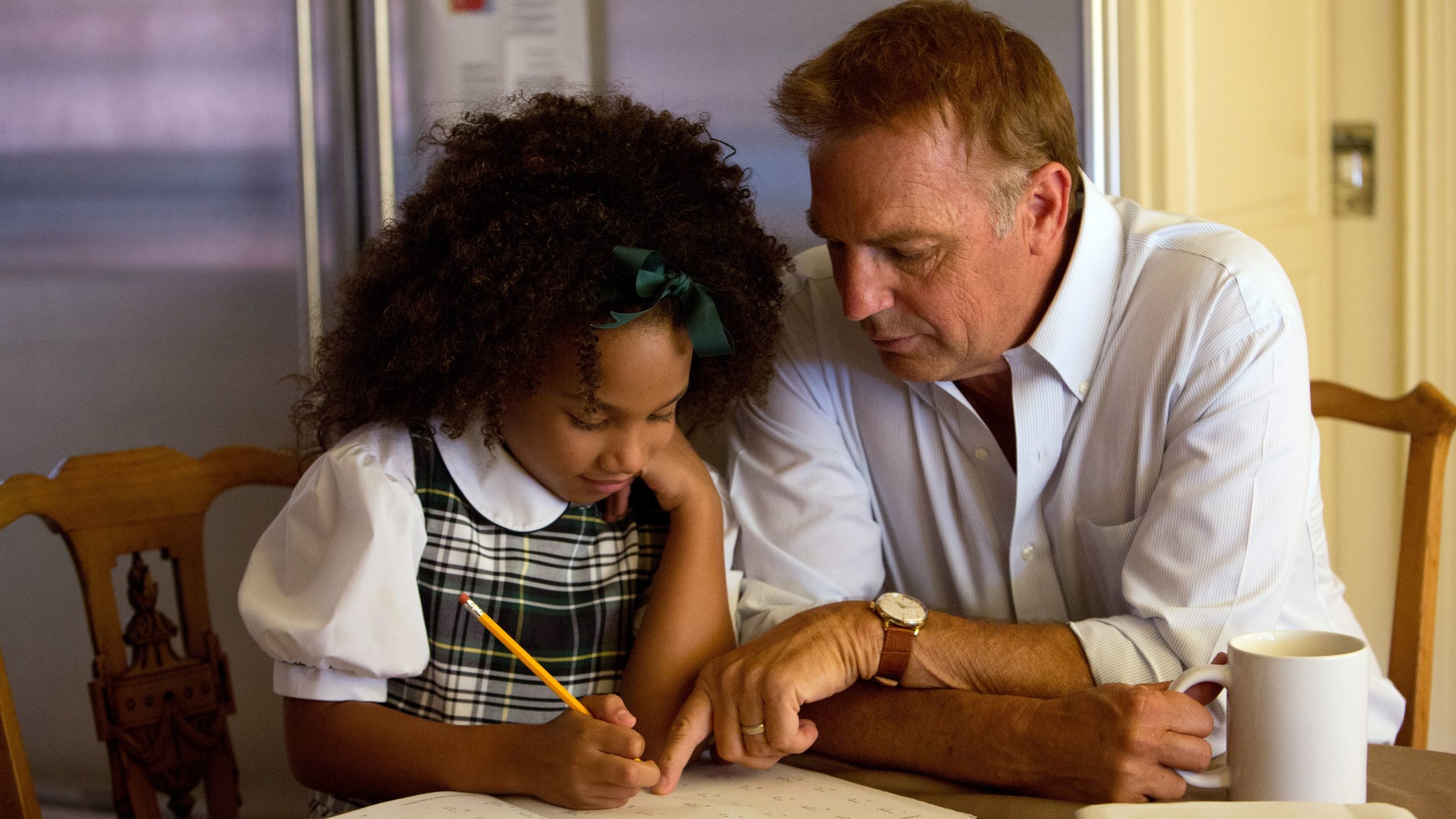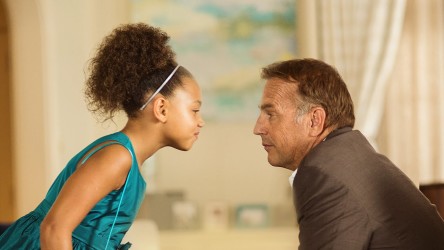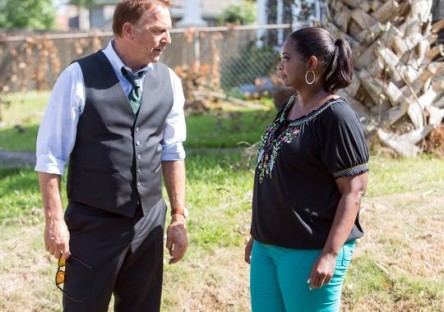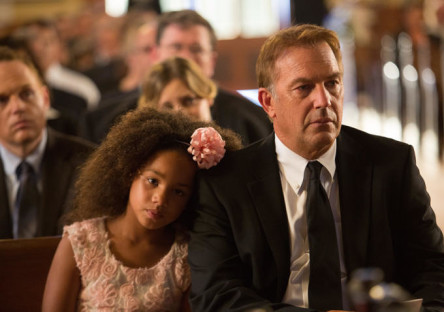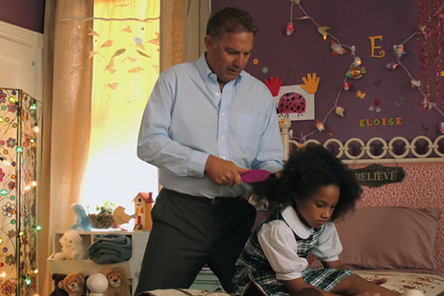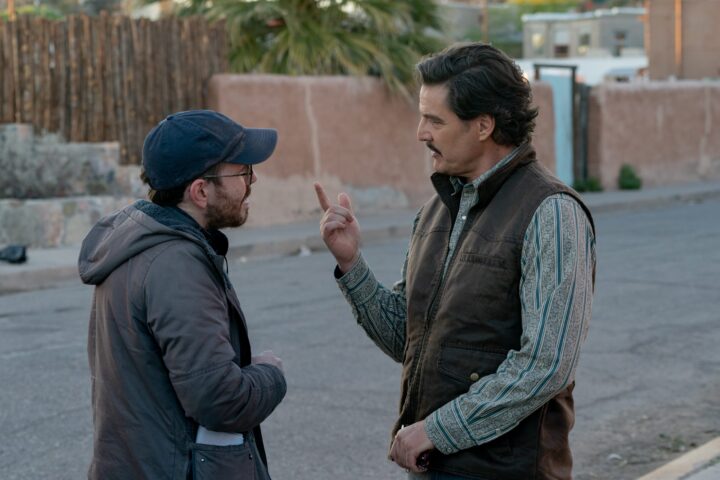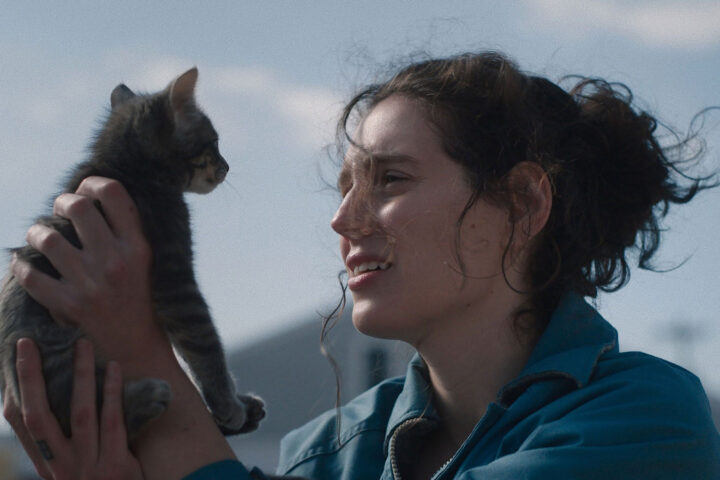There isn’t a more affable star than Oscar-winner Kevin Costner, the iconic actor-director with so many modern classics in his canon—Dances with Wolves, JFK, Field of Dreams, Bull Durham, A Perfect World—and an artist who brings a patented movie star sheen to every performance.
His new film, Black or White, was a real labor of love that he financed and which is now giving him some of the best reviews of his acting career, written and directed by his friend Mike Binder, who directed him in a similarly edgy role a decade ago in The Upside of Anger.
In their new film Black or White, Costner plays a wealthy Los Angeles attorney and grieving widower who finds himself single-parenting his bi-racial granddaughter to the disapproval of the girl’s paternal grandmother, played as a gale force by Octavia Spencer. A custody battle ensues, with both sides making believable and empathetic cases, and each having its own unsettled domestic demons.
But Black or White isn’t a courtroom drama, rather a character study of uncommon shading for a commercial movie. Costner’s alcoholic Elliot Anderson is a broken man trying to move past the loss of his wife and daughter, who died in childbirth, while nursing deep-seated issues related to her wayward, druggie boyfriend, who happens to be the girl’s absent father, and his own feelings about his African-American in-laws residing in South Central.
I caught up with Kevin Costner recently to chat about Black or White’s examination of family and race, and his thoughts on the film’s audience, the pressures of industry commerce and pursing passion projects at great risk. He never “falls out of love” with a script, he claims, and that’s clear in his both abrasive and tender performance as a man who has lost it all, except the one thing he’s desperate to hang onto. Elliot Anderson is one of Costner’s very best roles, and in Black or White the actor shows us a myriad of conflicted, not always politically correct perspectives—though sharply observed, honest ones—with equal emotional dexterity.
I understand that Mike wrote this role specifically for you.
He wrote it for me. I read it and I knew immediately that I want to make it. I was stunned at what Mike wrote. I had passed on four scripts that he had sent me. I thought I would either lose my friendship with him, or at the very least he would never send me another thing. I think it might’ve been my last ride. But he hung in there. That’s him. He made it the hard way. He’s from Detroit. He’s a standup. He started with Jim Carrey and all of those guys. They all know him, and how he is a world-class director and film writer, and you can feel his sense of humor in his films.
It’s a smart movie that has a degree of complexity and grayness to it, and one with mixed tones that are quite unusual for a mainstream movie. How do you anticipate the audience’s reaction?
I think it plays like a populist movie, even though it is something more. In my past career, I was very confident in other movies that ultimately felt like pushing rocks up a hill. But I found this one to be very accessible; that if we did this right, I wasn’t worried about finding an audience. Movies are for everybody at certain ages, but when you try to make it be for everybody it gets dumbed down or softened up. That’s another reason why this movie was not immediately made by a studio. It doesn’t fit the four quadrants; the requirements of young people.
I’ve done love stories, action movies, baseball movies, political thrillers. They all have their place. It sometimes is a movie like this that makes you pause for a second. We are all busy making our lives and our businesses and want to support something that we can get behind. And I believe in that. And I think movies can do that sort of thing. This movie changed me.
And you believed in the project so much that you financed it.
Yes. I went ahead and financed it, and then no one was picking it up. I was tapped out. The budget swelled to $9 million for a 26 shoot. We had scheduled 25 to get it done. I felt very confident. But the problem was that I had to talk to my wife. She said “Isn’t this a bad thing to do? I hear this is maybe not the smartest.” She’s very protective of me, but she was kind of going “Have you thought this through?” It’s not the smartest thing to do, but I have gone into my pocket for things that I feel strongly about in the past. How else do you get them done? And I called my longtime family friend, Rod Lake, an entrepreneur, and I said “Rod, do you want to help me with this movie?” We’ve known each other since we were eighteen-years-old. He has never been interested in the movies, and I had never tried to cross the line with him.
It’s not the worst business practice to play it safe. But I’m not that way. You have to do in life the things that you think that you should do. So now what am I doing? I’m going to eight cities and letting people see the movie. I’m taking it and letting people decide for themselves. But I also believe in this movie well past its theatrical life.
The business is now designed to overcrowd the multiplexes with blockbusters which make it hard for a film like Black or White to be seen. How important is box office to you?
Do we want our money back? We do. I feel more stressed about Rod’s money than I do mine, and that’s the mark of our friendship. We’re going to find out what the number is because someone is going to tell me that we were not number one, or even if we made it into the top five. If you get wrapped up in this number one weekend thing that we’ve gotten into, you will never make a movie like this.
And I think in my career a lot of my growth- Bull Durham cost $6 million and we couldn’t get it. And I finally got it made by leveraging Orion pictures, by agreeing to do more for them. And boy did I leverage them! I did that picture and then I gave them Dances with Wolves. And I think that they probably made $200 million off Bull Durham. It’s a classic. But it is a business based on commerce. And the number of screens will be based on the level of momentum that has been achieved by you as press, or something like that.
But movies have a life after an opening weekend and I’ve seen it happen. Does my ego want it to do really well? Yes. So does the studio. I understand that and I sweat it out. I’m not an idiot and I do want it back. My wife wants it back. But my problem is that I don’t fall out of love. I love the script.
Russell Crowe was recently asked about whether he would ever star in a sequel to Gladiator, and his reply was that he could not because he was too old, and that he needed to play age-appropriate roles. It was a commentary on casting in Hollywood. You’re now in a place where you have done everything in this business, and now are comfortably playing what might be called “character” roles. What do you want to do that you haven’t yet done?
My life is so much more than movies. Rod and I put our money into things that change the ocean in terms of oil spills and things like that; things I believe in. I’ve put an enormous amount of resources in that and it hasn’t paid off for me, but it’s very similar to the movies. I love where I’m going in terms of the movies. I’ve been fortunate that I’m still playing leads. But I’m not worried about playing a supporting role, and I’m not worried if I don’t do another movie. I want to do some westerns. That’s what I like. I’ve been working on something for four years and it’s going to come out in the fall. And mostly my family is what I’m focused on. I play original music around the world. So those are important parts of my life. My life is not simply revolving around movies. It’s around my family. I still have a little one, and my big kids are big now.
There’s a curiosity in the film that perhaps your daughter—who is never seen—could have maybe become wayward in some regard due to her relationship with her father.
Yes, perhaps her hard-assed father gave her a wild streak. You’re really right, the daughter could’ve been a wild child, and yet the film focuses on Reggie. I had a friend who felt really horrible at one point because his eighteen-year-old daughter was dating a man was much older. And he felt helpless. He was so worried about it that he didn’t even know whether the guy should be over to their house. As a performer, I had to investigate my own idea what my daughter was like. What was my own contribution to that? But you can’t help who your daughter brings to the door. What are you going to do?
The movie’s strength is that it doesn’t choose sides. There’s a lot to love about Rowena, right from her first scene.
I personally loved her. When he walks in the garage and sees all the suits from Sears, he says “Impressive.” He knows a lot of people make fun of that, but Rowena is always interesting. She’s holding together 20 people. She’s a force. He acknowledges that. He says to Reggie, “You come from a good family.” And there are people who might look down on it instead of admiring how strong she was to carve out a life like that. When he went down to South Central, he wasn’t afraid to go down there. There was a lot of love in that family.
Your final monologue on the witness stand really delivers the movie. You must have been just as intrigued reading it.
Yes. I thought “What’s going to happen here with his grandfather who is on the stand and was having difficulty with alcohol, who’s backed into a corner? What is he going to say?” Because we would all lose it in a situation like that. And then there he goes. He’s about to lose the connection to that which he loves the most—his wife and daughter.
It’s quite a speech, and says some provocative things very plainly.
I’m dealing with a difficult topic of racism, and Mike’s dialogue says it so eloquently: “That’s my first thought, not my second, third or fourth.” I felt a level of comfort in that when I read that. You know, I love baseball, but they could never write a speech about baseball the way that James Earl Jones spoke of it in Field of Dreams. Hearing that, I suddenly understood why America is in love with baseball. It’s eloquent.
It’s interesting that in that moment Elliot chooses not to reveal the events of the prior evening.
Yes. And it’s not the first time Reggie has attacked him. And if I reveal this in that last courtroom scene, that he pulled a knife on me, he goes away for life. So it’s complex.
I also appreciated that Rowena, Reggie’s own mother, is able to come to terms with her son’s shortcomings. There’s that great moment where she slaps his face. Three times.
It’s interesting. Some said, “Does she need him to hit him the third time?” We said, “Absolutely, and we’re not getting rid of it.” The first two meant, “Stop where you are.” That last one was hers. These are kind of the decisions that committees say, all the time, “Let’s get rid of that third one.” And for me the third one was the classic.
Kevin, it’s been a great pleasure.
Thank you, and also for your support of my films in the past. Thank you so much. I’m really glad I was able to make this movie and I’m glad how turned out. It says things are not perfect, but it’s as close to what we can do as a race.
